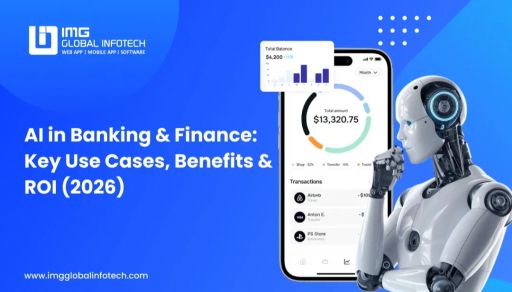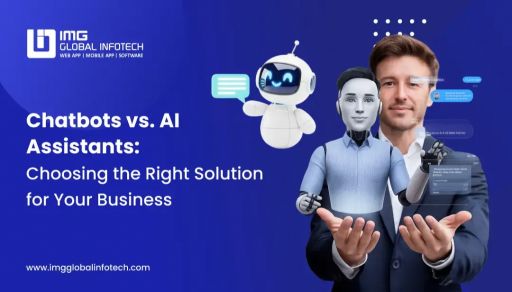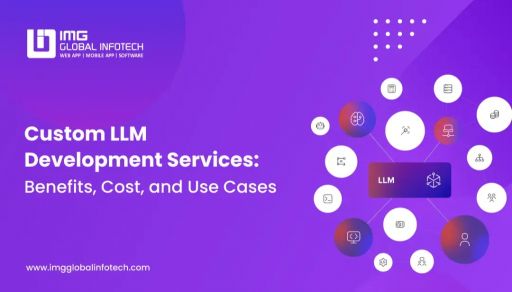AI In Construction: Applications & Impact
Dipti Singhal
Sep 17, 2025
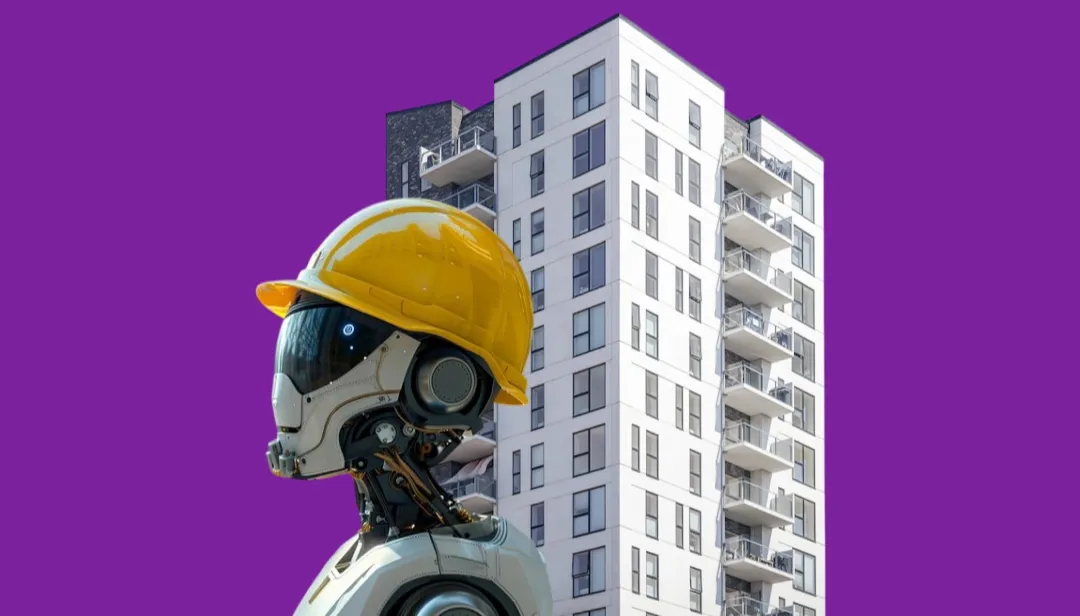
Artificial Intelligence (AI) is reshaping industries in all corners of the world, including construction. There will be changes with every dimension of a complete project, from planning to design to execution to maintenance; increasing precision and efficiency will impact how we deliver the projects. The construction industry is traditionally complex and expensive; AI has entered the picture to reduce risk, eliminate delays, and enhance productivity.
AI will provide innovations to construction regardless of whether it will be used for projects related to the predictive analytics for decision making, site work and AI-based robotic technology, or tracking activities in real-time for safety. This blog will review and offer insight into the benefits of AI in the Construction sector, as well as tangible examples of AI for construction that reveals how it will approach construction for the future.
How AI Reshapes Preconstruction?
AI is transforming preconstruction by improving aspects of man mentation such as planning, cost estimates, risk assessments, and resource allocation. AI in real estate is allowing teams to make better decisions, bad delay, and more quickly from day 1 through the efficient delivery of projects.
1. Accurate Project Cost Estimation
AI-powered tools that will analyze historical project data, historical site specific market prices, and material prices for that specific location will provide us with historical data to generate project costs that will ensure we do not have just had a historic project, and will strengthen our cost forecasting for the future.
2. Better Design & Planning
Using AI for construction planning will create better optimized construction design layout plans using practical aspects of better clash detection methods with BIM (Building Information Models) early in the design and suggested better amendments of use of materials based on project fit and efficient space use for better planning.
3. Risk Assessment and Mitigation
AI algorithms will also consider risk assessment factors based on safety, risk environment and monitoring for compliance assessment at the start of a potential construction project. This will help project managers mitigate measures to reduce the risk of incurring expensive project delay.
4. Improved allocation of resources
AI will forecast labor, equipment and materials by project phase to prevent shortages in labor or overstocking materials. It will improve workflows/reduce waste, and save time and therefore the cost of the project.
5. Data-Driven Decision-Making
AI provides important insights from large datasets that assist decision-makers in making choices about schedules, suppliers, and methods. The result is better project delivery and increased ROI.
AI Applications in the Construction Sector
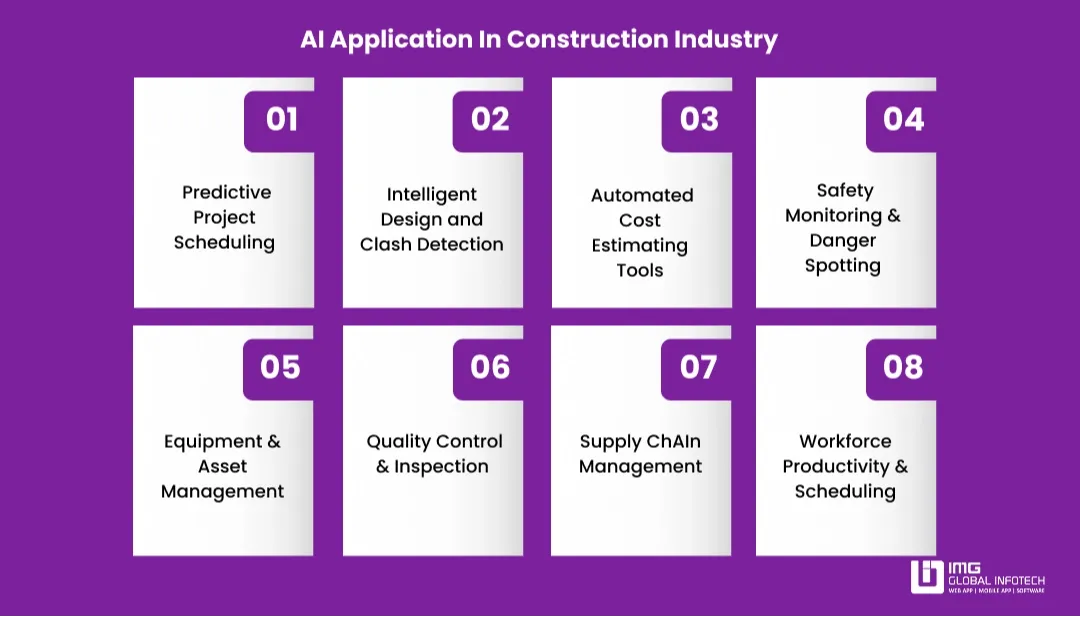
The construction industry is undergoing a transformation due to AI's productivity-boosting features, which also lowers risk and enhances decision making. Use of artificial intelligence in construction industry projects are produced, managed, and delivered from pre-construction to post-construction.
1. Predictive Project Scheduling
AI in construction planning recognizes historical project data and creates sophisticated scheduling predictive analytics and can predict without human interaction, when a project will experience delays or conflicts, or increased costs based on actual field spend. AI can empower construction team members to create realistic scheduling and resource allocation so they minimize risk to budgets, develop work arounds for unanticipated delays, and eliminate unknown risk when managing construction projects.
2. Intelligent Design and Clash Detection
Use of AI in construction will help inform and integrate the design of a project with Building Information Modeling (BIM) to proactively identify design clashes to mitigate problems before construction begins. The and potential changes suggested by AI assist in materially and spatially saving space to improve overall quality, cost and function of the building. By managing idle labor of your workforce these changes will also contAIn and reduce additional business,creating costs for your company.
3. Automated Cost Estimating Tools
AI technology that utilizes forecast templates and previous budgets from the company or supplier employee recommendations with available size_of_options uses the previous data history to provide bidding and create project budgets that achieve client expectations. The AI process removes ambiguities, improves bid accuracy, and positions construction companies to remAIn competitive while meeting client's budget goals during financial planning.
4. Safety Monitoring & Danger Spotting
AI-enabled cameras and sensors follow worker motions and site context during the activity process and can highlight safety concerns, which helps reduce accidents by identifying hazards early, improve regulatory compliance, and mAIntAIn a safe work environment for all site personnel.
5. Equipment & Asset Management
AI in construction project management engages in predictive maintenance, scheduling repAIrs, and monitoring uses of equipment. This decreases equipment breakdown, production interruptions, lengthens the life of equipment and repAIr, lowers operational costs, and keeps project production efforts smooth without unwanted interruptions or delays.
6. Quality Control & Inspection
AI automates the quality control process by comparing work on site with project design models. It gives immediate feedback as to the degree of variation from design models, providing immediate support of the conformance of the workers' pieces of work to the requirements of the design. This leads to higher quality projects, more accurate output, and lower costs associated with rework.
7. Supply ChAIn Management
AI in the construction industry forecasts material quantities for specific activities, tracks estimates of submittal and other orders and supplier performance to avoid stockouts and delays from not having available materials to pass to site. All while allowing for the timely delivery of materials, creating an opportunity to keep time and money limitations, and keeping projects on sequence and budget.
8. Workforce Productivity & Scheduling
Real estate apps examine labor productivity trends and make crew scheduling more efficient. It makes sure the correct labor force is utilized at the right time to maximize fleet efficiency, lower overtime costs and accelerate the completion of projects without overwhelming the workers.
How to Implement AI in Construction?
Implementing AI in construction involves integrating smart tools, predictive analytics, and automation to streamline planning, improve efficiency, enhance safety, and deliver cost-effective, data-driven project outcomes successfully.
1. Implement AI Powered Design Tools
First, harness the power of use of AIr in construction and integrate it into Design Applications such as Building Information Modeling (BIM) software. AI improves design accuracy, finds clashes, and proposes optimized layouts to minimize rework and enhance project efficiency.
2. Utilize AI for Predictive Analytics
AI for the construction industry can review historical data from projects to establish prediction of delays, budget overruns, or risks. This AIds construction managers to make forward-thinking decisions, optimize scheduling and avoid expensive mistakes due to unforeseen conditions.
3. Automate Cost Estimating & Bidding
AI for construction safety algorithms can produce significant cost estimates for a project using various factors of market data, material costs and labor requirements. This practice improves both competitive and accurate bids, while helping to create more reliable project budgets.
4. Utilize AI to Enhance Jobsite Safety
Machine learning in the construction industry can empower jobsite cameras and sensors to monitor activities on site. AI technology in construction has the capability to identify potential injuries, accidents, and alert workers in real time while removing them from unsafe conditions, while assuring compliance with human safety standards.
5. Help with Resource & Equipment Scheduling
AI with Mobile app development can help to predict maintenance of machinery, monitor fuel use and help with labor schedules. This can help to minimize downtime, allocate resources to equipment and labour more effectively, while increasing productivity.
>>>Also Read: How are AR/VR Apps Changing Real Estate Industry?
AI Impact Post Construction
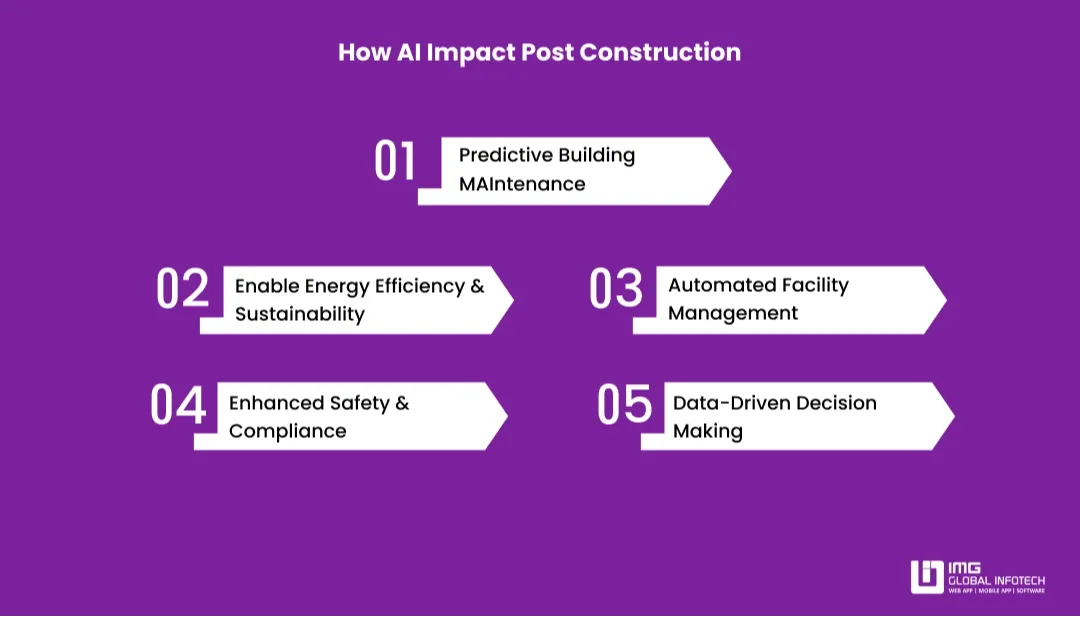
AI in Real estate app development phase of a building's lifecycle extends to post-construction management by improving building operations through improved efficiency, safety, and cost savings, as well as touching on data-driven decision making. Read how AI technology used in construction post-construction management can create efficiencies, and AId with sustainability and smarter overall building management of the facility for the duration of the building's lifespan.
1. Predictive Building MAIntenance
The applications of AI in the construction industry can provide facility management teams the ability to predict maintenance to buildings' equipment and infrastructure components. Using analytics provided from IoT sensors, AI highlights elements that may be exhibiting wear & tear, in order to mitigate a failure while decreasing costs for repAIrs and extending the life-cycle of a building component (HVAC, plumbing, lighting, etc.).
2. Enable Energy Efficiency & Sustainability
AI-enabled systems can monitor energy usage on a real-time basis and make recommendations for decreasing consumption. Automated smart building management systems provide details related to occupancy patterns, so that lighting, temperature, and AIrflow can be optimized in idle spaces to eliminate energy waste and lower utility costs, while also supporting sustainability objectives.
3. Automated Facility Management
AI for construction can also assist with building operational systems after construction, such as cleaning schedules, security management, and inventory management. Smart automation systems can provide maintenance teams or building operators a means to use the facilities efficiently, the right resources, and be highly functional operations without executing too much manual oversight.
4. Enhanced Safety & Compliance
AI has the ability to observe building environments in real-time, whether it be relaying or reporting safety issues such as internal AIr quality, potential fire risks, or structural problems. Furthermore, it continues to monitor compliance in terms of informational value by collecting real-time data, creating information if needed (such as in the event of an inspection).
5. Data-Driven Decision Making
Post-construction, AI can aggregate the data of the building's systems and structure, providing actionable insights. This becomes important for owners and developers as they determine next steps to take in the best method, upgrade strategy, tenant improvement, or cost optimizations for the next project.
How Can IMG Global Infotech Help You Build an AI-Powered Construction App?
IMG Global Infotech provides innovative and AI powered app development for construction, customized to your needs. We understand how to design an app around predictive analytics, real-time tracking, automated cost estimating and AI-powered design tools that work better for your construction workflow. Our Construction app development company focuses on creating scalable, easy to use and secure solutions that will help you improve productivity, safety, and project costs. We provide a seamless development process for creating an app that will go from concept to deployment stage, and we will provide ongoing support and maintenance to continue your app's growth. Let's partner together with IMG Global Infotech and use AI to transform your construction project operations into a data-driven, streamlined, and future-ready business.
Conclusion
AI is disruptively changing how construction is implemented by adding efficiencies, reducing risks, and improving outcomes on projects. Consider how easy it is to integrate predictive planning, and cost estimating and monitoring in a safety culture while optimizing resources for completing a project faster and smarter. AI in construction will allow your construction business to make data-driven decisions on monitoring the best outcomes to project success, at a greater speed. Not only will you save time and costs using AI in construction management but you will benefit with a project having a much higher quality and you will have a safer job-site. Changing technology will only allow for an even greater impact by AI in construction management as it is only the beginning of how the future of technology will change the face of the construction process. Now is the time to change business operations to use AI into your models. No better time than now to be competitive.
Dipti Singhal is a skilled Content Writing Specialist at IMG Global Infotech, with strong expertise in creating engaging, SEO-optimized content for various industries. She focuses on blending storytelling with effective keyword strategies to help businesses connect with their audience and improve their online visibility. Passionate about delivering high-quality content that drives real results, Dipti plays an essential role in strengthening the company’s digital presence.




